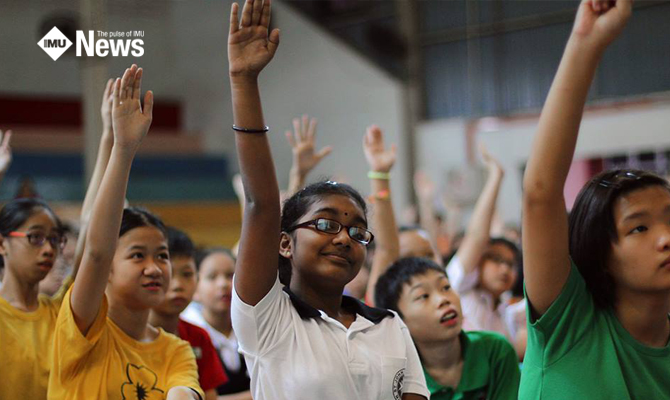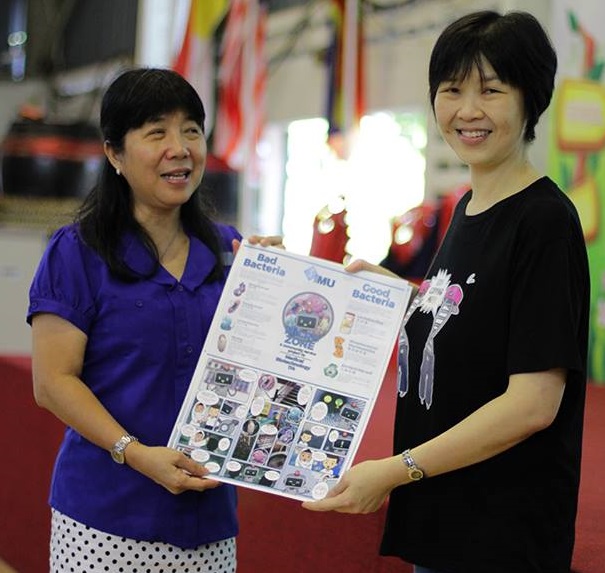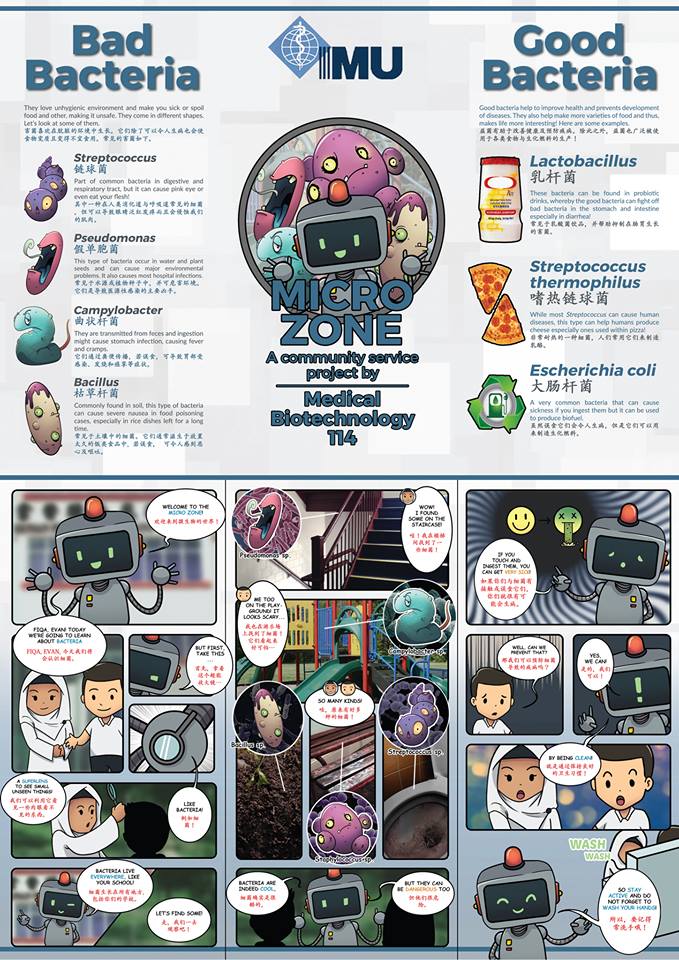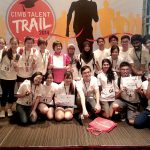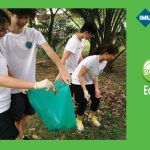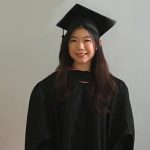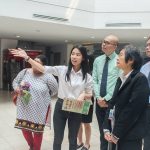13 January 2017 – IMU‘s Medical Biotechnology (MB) cohort of 1/14 (MB1/14) conducted a field visit to Sekolah Jenis Kebangsaan Cina (SJK(C)) Salak South as a part of one of their final semester modules ‘Applied Biotechniques in Biotechnology and Community Health’. This serves as a community service project that final year students of this programme conduct annually; and this year they had the chance to conduct a microbial screening within an establishment often shared by hundreds if not thousands of individuals communally.  This initial visit involved the MB1/14 students swabbing contact points or collecting water and soil samples from various sites of the school, with the hope that they could understand further the type of pathogenic microbes present in a community setting to educate the school students and its staff. More often than not, we are used to the hectic, busy lifestyle, and forget about the basics of hygiene, that is washing of hands. The main objective of this project was to gather enough samples possibly containing pathogenic microbial populations and performing biochemical tests alongside molecular profiling of said bacteria. These data will be eventually be presented to the proprietors of the school to remind them about the near and possible dangers lurking around them, especially in the absence of hygiene. Not only did the MB1/14 students get to give back to the community, they did it in the best they knew how, by applying the knowledge and techniques they have garnered over the course of 3 years of Medical Biotechnology programme. Once these samples were collected, they were stored in sterile containers and brought back to the laboratories of IMU so that subsequent identifications could be carried out.
This initial visit involved the MB1/14 students swabbing contact points or collecting water and soil samples from various sites of the school, with the hope that they could understand further the type of pathogenic microbes present in a community setting to educate the school students and its staff. More often than not, we are used to the hectic, busy lifestyle, and forget about the basics of hygiene, that is washing of hands. The main objective of this project was to gather enough samples possibly containing pathogenic microbial populations and performing biochemical tests alongside molecular profiling of said bacteria. These data will be eventually be presented to the proprietors of the school to remind them about the near and possible dangers lurking around them, especially in the absence of hygiene. Not only did the MB1/14 students get to give back to the community, they did it in the best they knew how, by applying the knowledge and techniques they have garnered over the course of 3 years of Medical Biotechnology programme. Once these samples were collected, they were stored in sterile containers and brought back to the laboratories of IMU so that subsequent identifications could be carried out.
| I am particularly interested in conducting this project as my final year research itself has a lot to do with bacterial cultures. I think that people’s common mistake is to think that what we do with these samples is just ordering lab results and diagnostics, while in reality, what we do goes way beyond that, even at the unseen impossible molecular levels; thus, I hope that this can shed more light for people who still have common misconceptions about what we study in this programme and our future job prospects. |
| Mak Siew Thong |
| I think that the incorporation of this project really captures the essence of Medical Biotechnology and is a healthy way for our students to be involved with current issues surrounding us. Headlines nowadays cover a lot on the rapid prevalence of bacterial infections to which commonly used antibiotics are not able to mitigate anymore, so going with the saying that ‘Prevention is better than cure’, we want to instill this mindset alongside the necessary knowledge to educators and elementary school students. |
| Dr Kok Yih Yih, Programme Director of MB who oversaw this community service project |
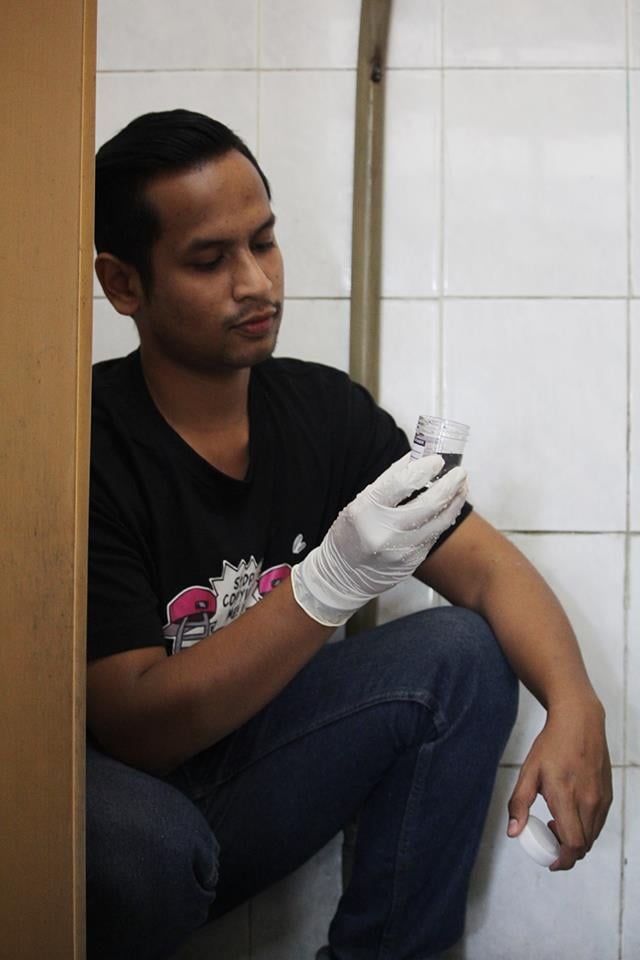 After strenuous sets of laboratory tests, the MB1/14 students gathered all of their findings and prepared visual media to deliver this community service message to their target audience. The results of these tests revealed a wide array of microbial species lurking around different parts of the school areas, such as the bacteria, Pseudomonas sp., one bacterial genus commonly found in hospital settings, are present in bench areas, playgrounds, doorknobs, and staircase railings. Pseudomonas are dangerous upon ingestion and might cause opportunistic infections, especially within individuals who are compromised immunologically. Other notable pathogenic bacteria found include Streptococcus sp., Enterococcus sp., and Bacillus sp., all of which cause various ingestion-related infections. 10 February 2017 – The MB1/14 students went back to SJK(C) Salak South to present their findings to a huge audience of 400 students and ten school staff. They went prepared to grab the attention of their younger audience by preparing cartoon-styled posters and quizzes with prizes related to hygiene, such as clean wipes and probiotic drinks, to further emphasise on their very important message. The children were very interested in the presentation, with most if not all of them actively participating in the quiz.
After strenuous sets of laboratory tests, the MB1/14 students gathered all of their findings and prepared visual media to deliver this community service message to their target audience. The results of these tests revealed a wide array of microbial species lurking around different parts of the school areas, such as the bacteria, Pseudomonas sp., one bacterial genus commonly found in hospital settings, are present in bench areas, playgrounds, doorknobs, and staircase railings. Pseudomonas are dangerous upon ingestion and might cause opportunistic infections, especially within individuals who are compromised immunologically. Other notable pathogenic bacteria found include Streptococcus sp., Enterococcus sp., and Bacillus sp., all of which cause various ingestion-related infections. 10 February 2017 – The MB1/14 students went back to SJK(C) Salak South to present their findings to a huge audience of 400 students and ten school staff. They went prepared to grab the attention of their younger audience by preparing cartoon-styled posters and quizzes with prizes related to hygiene, such as clean wipes and probiotic drinks, to further emphasise on their very important message. The children were very interested in the presentation, with most if not all of them actively participating in the quiz.
Posters were then distributed to the school staff and headmistress as a token of appreciation for letting the IMU students conduct their project and as reminders to prevent the transmission and possible infections of pathogenic bacteria. Before they left, they also have parting gifts for each classroom in the form of hand sanitizers which the class can use as a whole.
| I had a really great time with the kids and to see how enthusiastic they are towards the information presented opened my eyes to the fact that if younger people are taught about this type of facts since young, then perhaps they would be understand more the dangers of excessive and unnecessary use of antibiotics, while preventing pathogenic bacteria transmission could be as easy as washing your hands often. |
| Sarah Balqis, one of the MB1/14 students |
The MB1/14 students came back to IMU afterwards to continue with their routine of research project that at the time was currently ongoing, but not without an experience of translating whatever it is that they have learnt to something they can use for the good of the community.




